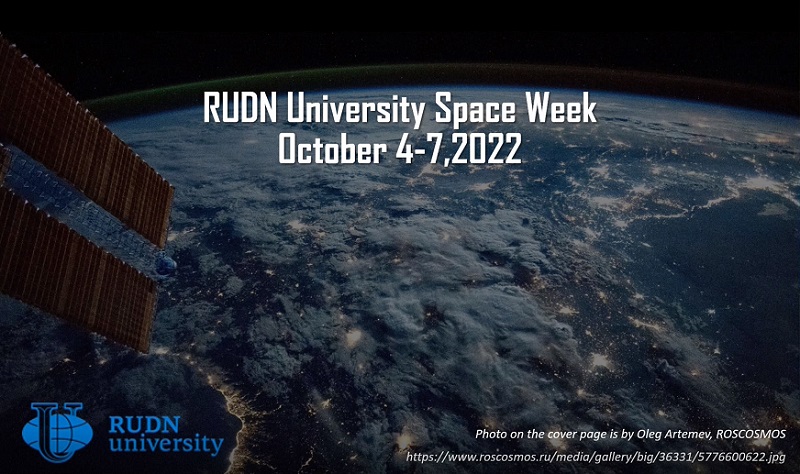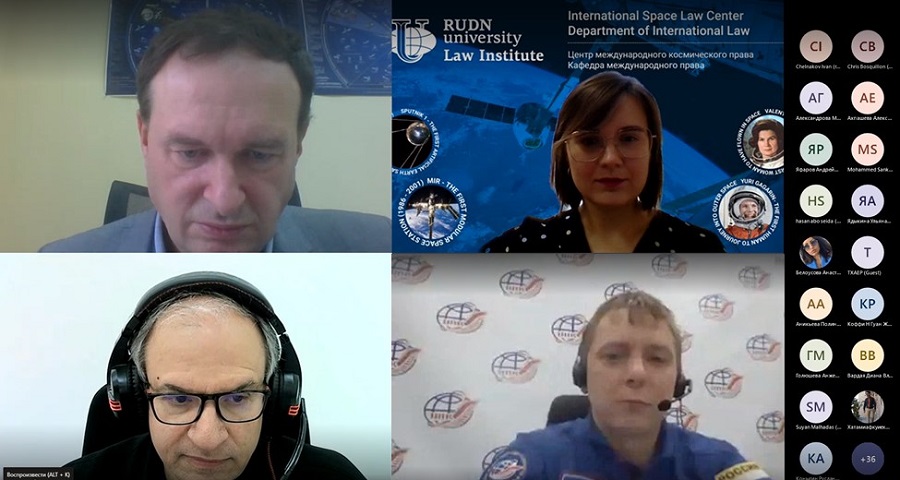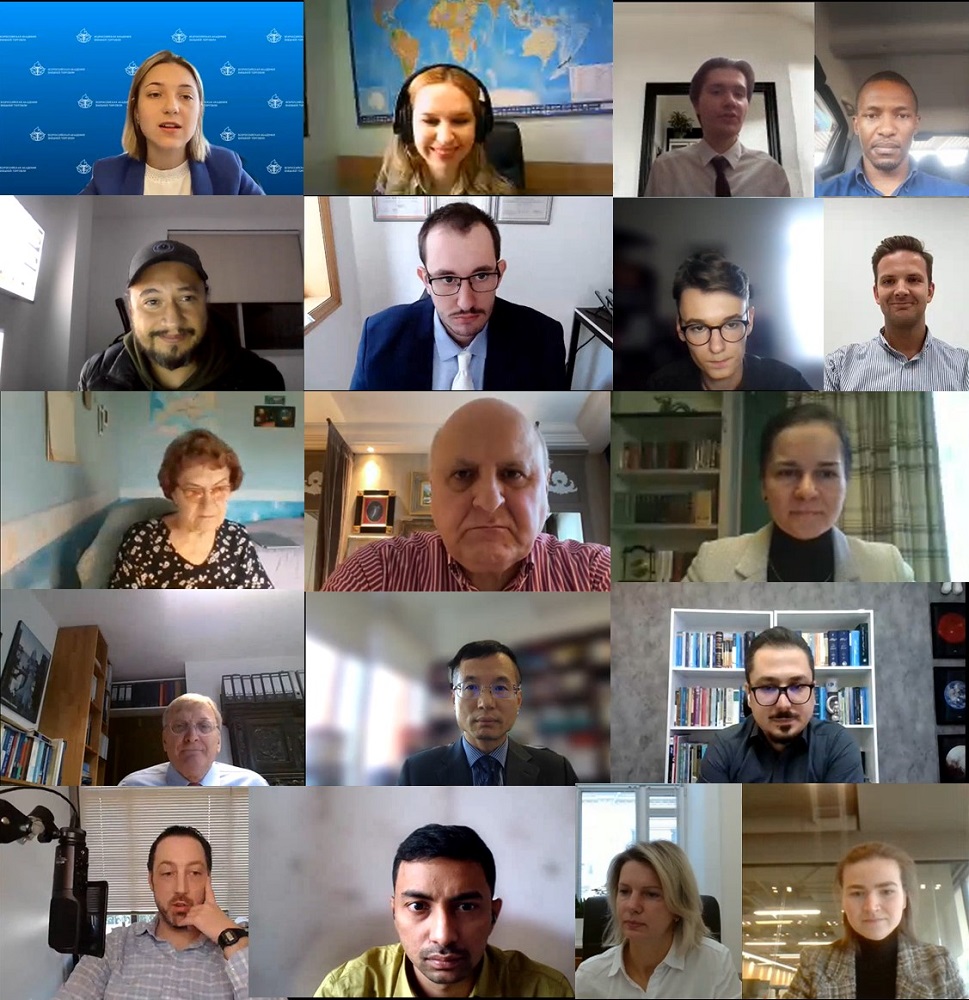RUDN University Space Week unites more than 330 participants from 48 countries
How to mine minerals on the moon? How is Venus similar to Earth? How to clear the orbit of the planet from debris? Why should astronauts be friends with lawyers? These questions were answered by the participants of The Second RUDN University Space Week.
The Plenary Session started October 4. The opening speech was made by Dr. Prof. Andrey Kostin, First Vice Rector, Vice Rector for Research of RUDN University, Corresponding member of the Russian Academy of Sciences. Among the participants:
Dr. Sergey Nedelko, Chief Scientific Secretary, International Intergovernmental Organization “Joint Institute for Nuclear Research”;
Ms. Elina Morozova, Executive Director of the Intersputnik International Organization of Space Communications;
Dr. Alexei Kutomanov, Deputy Director of the Mission Control Center of Central Research Institute for Machine Building;
Mr. André João Rypl (Brazil), Head of the Department of STI and Environment of the Brazilian Embassy in Moscow;
Prof. Dr. Antonio Prado (Brazil), Chief Researcher of the National Institute for Space Research (INPE).
The second day featured discussions on “Solar System Exploration”. The following experts took the floor:
Prof. Renuganth Varatharajoo (Malaysia), Deputy Vice Chancellor of the University Putra Malaysia, report “A Novel Combined Attitude and Sun Tracking System (CASTS) for Satellites”
Dr. Alice Gorman (Australia), Associate Professor of the College of the Humanities, Arts and Social Sciences at Flinders University, report “The Unique Cultural Heritage of Venus Exploration.”
Dr. Lev Zeleniy, Academician of the Russian Academy of Sciences, Science Advisor of Space Research Institute of Russian Academy of Sciences, report “Venus — A Strange Sister of the Earth.”
Dr. Piero Benvenuti (Italy), member of the International Astronomical Union (IAU) and Professor in the Physics and Astronomy Department of the University of Padua, report “Why Astronomy is important to Science and Society and why national and international legislation must protect it?”
Dr. Ian Crawford (United Kingdom), Professor of the Department of Earth and Planetary Sciences at Birkbeck, University of London, report “Why we should build an international Moon base?”
Ms. Giuliana Rotola (Italy) Ph.D. student at Sant’Anna School of Advanced Studies (Italy), report “Satellite Constellations: international law, national policy, and industry perspectives”.
The third day was dedicated to “Space Systems and Planetary Resources”. The experts discussed:
- using integral indexes in astrodynamics,
- mining the Moon to develop industry and save life on Earth,
- synthetic-aperture radar remote sensing,
- the Moon as a potential colony for earthlings.
The participants watched a film about the Gagarin Russian Cosmonaut Training Center and talked with Roscosmos test cosmonaut Kirill Peskov.
The same day, Principal of Three Country Trusted Broker (TCTB) — Chuck Dickey (USA) closed the Session with a report “International Cooperation for the Remediation of Orbital Debris.”
October 7 featured a round table on topical issues of international space law (in the framework of Blischenko readings) divided into 3 parts.
The round table was opened by Dr. Prof. Aslan Abashidze, Head of the Department of International Law of RUDN University, Vice-Chairperson of the UN Committee on Economic, Social and Cultural Rights, Member of the International Institute of Space Law (IISL), Chairman of the International Law Commission of the United Nations Association of Russia, Honored Lawyer of the Russian Federation.
The second part started from the report of Dr. Anna Tarasova (Russia), Head of the International Law Department of the Southern Federal University.
The third part began with the lecture of Dr. Mark J. Sundahl (USA), Professor of Law at Cleveland State University College of Law, Director of Global Space Law Center, on the topic “Space as a Laboratory of Peace.”
In the framework of the round table, many renowned international lawyers and practitioners participated, including experts from Germany, Hong-Kong, Greece, India, Iran, Mexico and SAR.
The event was attended by more than 330 people from 48 countries:
Australia, Albania, Algeria, Afghanistan, Belgium, Brazil, United Kingdom, Germany, Ghana, Greece, Haiti, Egypt, India, Indonesia, Iran, Iraq, Italy, Kazakhstan, Cameroon, Canada, China, Kyrgyzstan, Malaysia, Mexico, Moldova, Mongolia, Nigeria, Nicaragua, United Arab Emirates, Paraguay, Russia, Serbia, Syria, the United States, Tajikistan, Tunis, Turkmenistan, Turkey, Uzbekistan, Ukraine, France, Chad, Sri Lanka, Ecuador, Eritrea, Estonia, South Africa, and Japan.
Organizers of RUDN University Space Week:
- G.Zhukov International Space Law Centre of the Department of International Law (RUDN Institute of Law)
- RUDN Engineering Academy.
Partners of The Second RUDN University Space Week:
- "Intersputnik’ International Organization of Space Communications,
- Space Research Institute of the Russian Academy of Sciences,
- State Space Corporation ROSCOSMOS,
- International Intergovernmental Organization “Joint Institute for Nuclear Research”,
- Central Research Institute for Machine Building,
- Keldysh Institute of Applied Mathematics of the Russian Academy of Sciences.
For reference:
The World Space Week is celebrated annually following the UN General Assembly Resolution 54/68 (dated 6 December, 1999) from 4 to 10 October. The dates are associated with the launch of the first artificial Earth satellite Sputnik-1 on October 4, 1957, and the Treaty on the Principles of Activities of States in the Exploration and Use of Outer Space, Including the Moon and Other Celestial Bodies, signed on October 10, 1967 — the main international treaty in international space law.
A RUDN agrotechnologist has identified wheat genotypes that are resistant to a dangerous fungal pathogen that infects plants even before the snow melts and reduces yields.
RUDN University engineers have calculated the parameters of a system that can prevent lunar power plants from overheating. These developments will be needed when planning for long-term lunar missions and colonizing the satellite.
Landfills are the third largest source of anthropogenic methane in the world. They account for ~11% of estimated global emissions. Methane is 80 times more powerful than carbon dioxide and is the second largest driver of man-made climate change. Scientists from around the world met at Zhejiang University's Hangzhou campus to determine the best available technologies for recovering energy and materials from non-recyclable residual waste.


